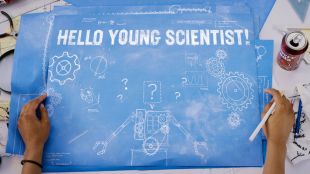Education and Science, Forum, Good for Business, Lithuania, Technology
International Internet Magazine. Baltic States news & analytics
Monday, 15.12.2025, 01:25
Google spots Lithuanian talent
 Print version
Print version |
|---|
Laura attempts to answer the question how nanoparticles (NPs) affect the nature. For example, sunscreens are among the products we are encouraged to use to protect ourselves from UV rays. However, researchers have found that TiO2 NPs, compound of sunscreen, can harm the coral reefs. Laura argues that the hazardous effect influence not only the particular organism, but its surroundings. Her goal is to examine, how nanoparticles influence living organism around us.
Encouraged to read books about the world from a young age by her mother, who’s a science teacher, Laura learned that nanoparticles are in everything from sunscreen to socks. She wondered about their effect on living organisms and used bean sprouts and freshwater to do some testing. She discovered that nanoparticles can lead to higher chemical levels in environments, could potentially force species from their natural habitats and may even lead to extinction. She hopes this research leads to new precautions for nanoparticles and increased awareness about biological effects of chemicals.
Learn more about this young talent from Lithuania in her own words.
- What was the inspiration behind your project?
- The greatest inspiration for my project is ecology. I’m concerned about keeping our planet and its organisms safe. Nanotechnologies is part of a widely expanded research field and various life changing inventions were created by using them. Though in my opinion, science has to be developed comprehensively, it has to be beneficial for humanity and not harmful for nature. While reading about nanotechnologies I had to face the fact that there’s little information about toxicity of nanomaterials. I’ve started thinking about how I could examine the harmful impact of nanoparticles on organisms, for example plants. My teacher encouraged me to try to study the effects to growth processes.
- When and why did you become interested in science?
- Nature and science fascinated me since I can remember. I loved taking huge science atlases from the bookshelves and flipping through pages looking for illustrations. When I learned to read, I used to search the pages from atlases I liked the most and read them. If I didn’t know what something meant, I would take the book and go to my mother. She explained what I couldn’t understand. She also took me to her classroom, where there were various models and devices for demonstrative experiments. I remember my sister and I playing with these devices and our mother explaining to us why the devices were created. Then in school, I started learning things by myself, and could explore deeper the laws of nature. I want to know answers to the questions that pop in my head while reading articles or discussing various topics. I want to help to improve our environment and help people. I see science as a way to do that.
- What words of advice would you share with other young scientists?
- Every time you are able to learn from a difficult situation, you win. You create your own opportunities. Do not be afraid to dream because what is life without crazy ideas?
Read full article in English at googleforeducation blog or find out more about Laura’s project.








 «The Baltic Course» Is Sold and Stays in Business!
«The Baltic Course» Is Sold and Stays in Business!

